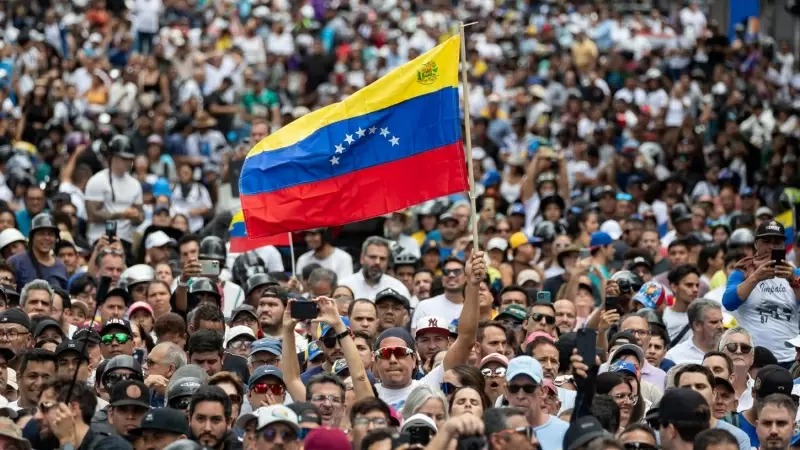The 2024 elections in Venezuela have plunged the nation into deeper political turmoil as the contested results between President Nicolás Maduro and opposition candidate Edmundo González escalate tensions. Allegations of voter fraud, suppression, and violence have marred the election process, with both sides claiming victory. This political crisis significantly impacts the Venezuelan populace, particularly those seeking asylum and immigration opportunities in the United States.
As the dispute intensifies, Venezuelan citizens face heightened persecution and instability, prompting a surge in asylum applications. The U.S. immigration system, already grappling with an influx of Venezuelan asylum seekers from previous crises, must now navigate the complexities introduced by the 2024 election fallout. Understanding how this election dispute affects U.S. asylum and immigration policies is crucial for those seeking refuge and for policymakers addressing this humanitarian challenge.
Background of the Venezuelan Election Dispute
The 2024 Venezuelan elections have been marred by allegations of fraud, voter suppression, and political violence. President Nicolás Maduro’s government claimed victory, but opposition leaders and international observers have decried the elections as illegitimate. This dispute has deepened the country’s political instability, which has been ongoing since the controversial 2018 elections.
Timeline of the Venezuelan Election Dispute and Immigration Crisis
2015-2018: The crisis deepened, resulting in a significant increase in the number of Venezuelans fleeing their country. By 2018, approximately 3 million Venezuelans had left, with the U.S. becoming a primary destination. Cities like Miami saw the highest concentrations of Venezuelan immigrants, with requests for asylum rising sharply.
2019: The political situation in Venezuela reached a boiling point when opposition leader Juan Guaidó declared himself interim president, challenging Maduro’s rule. This further intensified the exodus, with U.S. asylum applications from Venezuelans exceeding 100,000. The crisis also began to impact states like Colorado, which saw a notable increase in Venezuelan immigrants seeking stability and security.
2020-2023: The COVID-19 pandemic exacerbated the already dire conditions in Venezuela, pushing even more citizens to seek refuge abroad. The U.S. continued to see a steady flow of asylum seekers, with Denver emerging as a significant hub for Venezuelan immigrants due to its supportive community and resources.
2024: The contentious election between Nicolás Maduro and Edmundo González sparked new waves of violence and repression, leading to further displacement. Current estimates suggest that over 7 million Venezuelans have left their homeland, with the U.S. remaining a key destination. In Colorado, the Venezuelan community has grown substantially, with Denver and surrounding areas providing essential support networks.
The ongoing political crisis in Venezuela, coupled with the recent election dispute, continues to drive Venezuelans to seek asylum in the U.S., highlighting the urgent need for comprehensive immigration solutions and support for these vulnerable populations.
Current U.S. Immigration and Asylum Policies
The United States has a long history of providing asylum to individuals fleeing persecution and violence. Asylum policies are designed to offer protection to those who demonstrate a well-founded fear of persecution based on race, religion, nationality, political opinion, or membership in a particular social group. In recent years, the U.S. has seen a significant increase in asylum applications from Venezuelans, reflecting the dire situation in their home country.
Recent trends indicate a sharp rise in the number of Venezuelans seeking asylum in the U.S. In 2019, Venezuela became the leading country of origin for asylum seekers, surpassing other countries with long-standing conflicts. The influx of Venezuelan asylum seekers has put a strain on the U.S. immigration system, leading to longer processing times and heightened scrutiny of applications.
Immediate Impact on Asylum Seekers
The political unrest in Venezuela has led to a surge in asylum seekers, with many fleeing the country under desperate circumstances. The immediate impact on these individuals is profound, as they face numerous challenges upon arrival in the U.S. These challenges include navigating a complex legal system, securing legal representation, and coping with the emotional and psychological toll of their experiences.
Asylum seekers from Venezuela often arrive with limited resources and little understanding of the U.S. immigration system. The backlog of asylum cases has resulted in lengthy waits for hearings, leaving many in a state of limbo for years. During this time, they must find ways to support themselves and their families, often relying on community organizations and charities for assistance.
U.S. Government’s Response
The U.S. government has closely monitored the ongoing political turmoil in Venezuela, recognizing its potential impact on asylum and immigration trends. The U.S. State Department recently expressed growing frustration with Venezuelan electoral authorities through spokesperson Vedant Patel. Patel’s statement on Venezuelan elections, “The international community, including the United States, is running out of patience waiting for Venezuelan electoral authorities to be honest and publish complete and detailed data on the elections so that everyone can see the results” (NBC News, 2024).
This statement underscores the U.S. government’s stance on the need for transparency and fairness in Venezuela’s electoral process, a crucial factor influencing migration patterns.
As reported by NBC News, in Denver, Mayor Mike Johnston highlighted the significant influx of migrants, noting that the city has received more migrants per capita than any other U.S. city in the last year. The local repercussions of the Venezuelan crisis are compounding, Colorado state officials are proactively assessing potential local repercussions. Jon Ewing, spokesman for Denver Human Services, explained to Axios that if there is another spike in migrant arrivals, the city does not plan to return to the previous model of providing extended shelter to new migrants. However, the actual number of migrants arriving in cities like Denver remains uncertain due to Mexico’s strict measures to curb northbound migration and President Biden’s executive action on asylum in June, which severely limits asylum applications (Alayna Alvarez, Axios, 2024).
By addressing these challenges, the U.S. government and local authorities demonstrate their commitment to effectively managing the consequences of Venezuela’s political crisis.
Humanitarian Concerns
The conditions faced by Venezuelan immigrants and asylum seekers are dire. Many have experienced trauma and persecution in their home country and continue to face significant challenges upon arrival in the U.S. Humanitarian organizations play a crucial role in providing support, including legal assistance, mental health services, and necessities such as food and shelter.
Non-governmental organizations (NGOs) and community groups have stepped in to fill the gaps left by the government, offering resources and advocacy for Venezuelan asylum seekers. These organizations help navigate the asylum process, provide legal representation, and ensure that the basic needs of asylum seekers are met. Their work is essential in assisting Venezuelan immigrants to rebuild their lives and integrate into American society.
Legal and Bureaucratic Challenges
The U.S. asylum system is complex and often daunting for those unfamiliar with its intricacies. Venezuelan asylum seekers face a myriad of legal and bureaucratic challenges, including gathering evidence of persecution, meeting stringent filing deadlines, and attending multiple court hearings. The lack of legal representation exacerbates these challenges, as many asylum seekers cannot afford private attorneys and must rely on pro bono services.
The backlog of asylum cases in the U.S. immigration courts has reached unprecedented levels, with wait times for hearings stretching into several years. This delay not only prolongs the uncertainty for asylum seekers but also creates additional hurdles as they try to build new lives in the U.S. while awaiting decisions on their cases.
Potential Long-term Effects
The long-term effects of the Venezuelan crisis on U.S. immigration trends and policies are still unfolding. The sustained influx of Venezuelan asylum seekers could lead to significant changes in U.S. asylum policy, including potential reforms to address the backlog and streamline the processing of applications. Additionally, the presence of a large Venezuelan diaspora in the U.S. may influence future immigration policies and foster stronger bilateral relations between the two countries.
The ongoing crisis also highlights the need for comprehensive immigration reform that addresses the root causes of forced migration and provides humane and efficient pathways for those seeking refuge. The experience of Venezuelan asylum seekers underscores the importance of a fair and responsive immigration system that can adapt to global humanitarian crises.
Personal Stories
To illustrate the human impact of the Venezuelan election dispute, it is important to share the personal stories of asylum seekers. For example, Maria, a young mother from Caracas, fled Venezuela with her two children after facing threats from government forces. Despite the hardships of leaving her home and starting anew in a foreign country, Maria remains hopeful for a better future and is grateful for the support she has received from the Venezuelan community and local NGOs in the U.S.
Conclusion
The Venezuelan election dispute of 2024 has far-reaching implications for U.S. asylum and immigration policies. As the crisis continues, it is essential to address the humanitarian needs of Venezuelan asylum seekers and consider policy changes that reflect the evolving situation. Providing comprehensive legal support, streamlining asylum processes, and offering humanitarian aid are crucial steps toward safeguarding the futures of those fleeing persecution.
Are you a Venezuelan asylum seeker in Denver or nearby areas in need of legal assistance? Secure your future with the help of King Golden Law, PLLC. Call us today to speak with our experienced Denver immigration attorneys.

